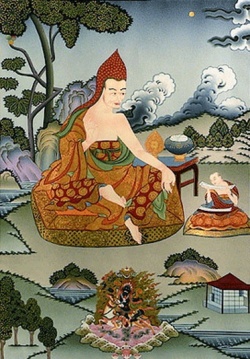Difference between revisions of "Vasubandhu (Jp. Seshin)"
(Created page with "thumb|250px| <poem> Vasubandhu (Jp. Seshin) One of the most important Mahayana teachers. Vasubandhu was born in Gandhara in India in the fifth century...") |
|||
| (2 intermediate revisions by the same user not shown) | |||
| Line 1: | Line 1: | ||
[[File:Vasubandhu.JPG|thumb|250px|]] | [[File:Vasubandhu.JPG|thumb|250px|]] | ||
<poem> | <poem> | ||
| − | Vasubandhu (Jp. Seshin) | + | [[Vasubandhu]] (Jp. [[Seshin]]) |
| − | One of the most important Mahayana teachers. Vasubandhu was born in Gandhara in India in the fifth century C.E. and is known as T'ien-ching in Chinese Buddhist texts. It is said that he first studied the Theravada teachings and wrote the Abhidharmakoshabhasyam but soon turned to Mahayana under the influence of his elder brother Asanga, who was a scholar of the Consciousness Only doctrine. Works attributed to Vasubandhu are so many that he is known as the monk of a thousand writings. In the Pure Land tradition, he is listed as the second of the Pure Land patriarchs in India becasue of his Treatise on the Sutra of Immeasurable Life (Wang-sheng lun). As no extant copies of the Wang-sheng lun exist in Sanskrit or Tibetan, however, scholars have come to doubt whether the author is the same Vasubandhu who systematized the Yogacara school (Hirakawa, 1979; 101-11). | + | One of the most important [[Mahayana]] [[teachers]]. [[Vasubandhu]] was born in [[Gandhara]] in [[India]] in the fifth century C.E. and is known as T'ien-ching in {{Wiki|Chinese}} [[Buddhist texts]]. It is said that he first studied the [[Theravada]] teachings and wrote the [[Abhidharmakoshabhasyam]] but soon turned to [[Mahayana]] under the [[influence]] of his elder brother [[Asanga]], who was a [[scholar]] of the [[Consciousness Only]] [[doctrine]]. Works attributed to [[Vasubandhu]] are so many that he is known as the [[monk]] of a thousand writings. In the [[Pure Land]] [[tradition]], he is listed as the second of the [[Pure Land]] [[patriarchs]] in [[India]] becasue of his Treatise on the [[Sutra]] of [[Immeasurable]] [[Life]] ([[Wang-sheng lun]]). As no extant copies of the [[Wang-sheng lun]] [[exist]] in [[Sanskrit]] or [[Tibetan]], however, [[scholars]] have come to [[doubt]] whether the author is the same [[Vasubandhu]] who systematized the [[Yogacara]] school (Hirakawa, 1979; 101-11). |
References: | References: | ||
| Line 9: | Line 9: | ||
Hirakawa, Akira, “Jujubibasharon no chosha ni tsuite”, Indogaku bukkyogaku kenkyu, 5-2, 1957. | Hirakawa, Akira, “Jujubibasharon no chosha ni tsuite”, Indogaku bukkyogaku kenkyu, 5-2, 1957. | ||
| − | ----- Indo Bukkyoshi, vol.2 (Tokyo: Shunjusha, 1979). | + | ----- Indo Bukkyoshi, vol.2 ({{Wiki|Tokyo}}: Shunjusha, 1979). |
| − | Williams, Paul Mahayana Buddhism : the Doctrinal Foundations (London: Routledge, 1989). | + | Williams, Paul [[Mahayana]] [[Buddhism]] : the [[Doctrinal]] Foundations ({{Wiki|London}}: Routledge, 1989). |
</poem> | </poem> | ||
{{R}} | {{R}} | ||
Latest revision as of 13:59, 2 September 2014
Vasubandhu (Jp. Seshin)
One of the most important Mahayana teachers. Vasubandhu was born in Gandhara in India in the fifth century C.E. and is known as T'ien-ching in Chinese Buddhist texts. It is said that he first studied the Theravada teachings and wrote the Abhidharmakoshabhasyam but soon turned to Mahayana under the influence of his elder brother Asanga, who was a scholar of the Consciousness Only doctrine. Works attributed to Vasubandhu are so many that he is known as the monk of a thousand writings. In the Pure Land tradition, he is listed as the second of the Pure Land patriarchs in India becasue of his Treatise on the Sutra of Immeasurable Life (Wang-sheng lun). As no extant copies of the Wang-sheng lun exist in Sanskrit or Tibetan, however, scholars have come to doubt whether the author is the same Vasubandhu who systematized the Yogacara school (Hirakawa, 1979; 101-11).
References:
Hirakawa, Akira, “Jujubibasharon no chosha ni tsuite”, Indogaku bukkyogaku kenkyu, 5-2, 1957.
Indo Bukkyoshi, vol.2 (Tokyo: Shunjusha, 1979).
Williams, Paul Mahayana Buddhism : the Doctrinal Foundations (London: Routledge, 1989).
